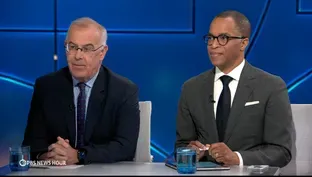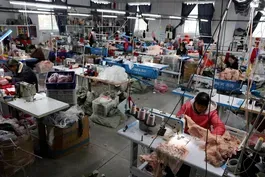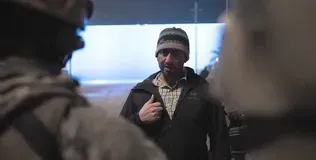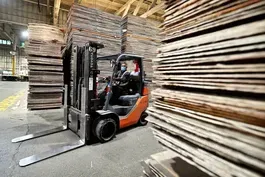
Patriotism takes hold in Taiwan amid threat from China
Clip: 4/11/2025 | 6m 29sVideo has Closed Captions
Patriotism takes hold in Taiwan in face of growing threats from China
Taiwan is strengthening its military and society to fend off aggression from mainland China. In recent years, the people in Taiwan have increasingly identified themselves as Taiwanese, not Chinese, in everything from food to sports. Nick Schifrin reports for our series Taiwan: Risk and Resistance.
Problems with Closed Captions? Closed Captioning Feedback
Problems with Closed Captions? Closed Captioning Feedback
Major corporate funding for the PBS News Hour is provided by BDO, BNSF, Consumer Cellular, American Cruise Lines, and Raymond James. Funding for the PBS NewsHour Weekend is provided by...

Patriotism takes hold in Taiwan amid threat from China
Clip: 4/11/2025 | 6m 29sVideo has Closed Captions
Taiwan is strengthening its military and society to fend off aggression from mainland China. In recent years, the people in Taiwan have increasingly identified themselves as Taiwanese, not Chinese, in everything from food to sports. Nick Schifrin reports for our series Taiwan: Risk and Resistance.
Problems with Closed Captions? Closed Captioning Feedback
How to Watch PBS News Hour
PBS News Hour is available to stream on pbs.org and the free PBS App, available on iPhone, Apple TV, Android TV, Android smartphones, Amazon Fire TV, Amazon Fire Tablet, Roku, Samsung Smart TV, and Vizio.
Providing Support for PBS.org
Learn Moreabout PBS online sponsorshipAMNA NAWAZ: Over the past few days, we have brought you a series of reports about how Taiwan is strengthening its military and society in order to fend off aggression from mainland China.
Tonight, Nick Schifrin looks at how, in recent years, the people of Taiwan have increasingly identified themselves as Taiwanese, not Chinese, in everything from food to sport.
This is all part of our series "Taiwan: Risk and Resistance."
NICK SCHIFRIN: Welcome to Clarissa Wei's kitchen.
CLARISSA WEI, Author, "Made in Taiwan": It's interesting to see how this dish has evolved over the years.
NICK SCHIFRIN: She's teaching me a classic Taiwanese dish.
CLARISSA WEI: Today, we're making beef noodle soup.
NICK SCHIFRIN: Served with a dash of history... CLARISSA WEI: People don't realize even the diversity that is in this island.
NICK SCHIFRIN: ... and a side of politics.
CLARISSA WEI: In terms of our political stance, who we are as a country, we are Taiwanese.
So, now we're going to add in the noodles.
NICK SCHIFRIN: Wei is the Taiwanese-American author of a Taiwanese cookbook whose family has lived on this island for two centuries.
CLARISSA WEI: I'm using black soybean soy sauce today, and that's very unique to Taiwan.
NICK SCHIFRIN: Turns out, in this pot of beef noodle soup is the melting pot that is Taiwan.
CLARISSA WEI: All of these ingredients together, to me, it really tells the story of, like, resilience and what it was like in the '50s, when the Chinese refugees came over fleeing the Chinese civil war.
NARRATOR: Formosa, last-ditch stronghold of the Chinese nationalist army.
NICK SCHIFRIN: In 1949, Chinese nationalists lost the civil war to the communists and fled to Taiwan, also called Formosa.
CLARISSA WEI: This concept of a Taiwanese identity is very new.
In my parents' age, they did not identify necessarily as Taiwanese.
NICK SCHIFRIN: But, today, Taiwan's identity is a proud democracy, with influence from indigenous tribes, a half-century of Japanese colonial rule... CLARISSA WEI: Our rice vinegar is actually made in the Japanese style, not the Chinese style.
NICK SCHIFRIN: ... and 75 years of U.S. presence.
CLARISSA WEI: People have brought different food cultures, different food techniques.
And where we are right now, people are sort of combining that together to form something that is very uniquely Taiwanese.
NICK SCHIFRIN: A uniqueness that Wei says has fused because of Chinese behavior and Chinese military action directed at Taiwan.
There is a politics in Taiwan involved with that Taiwanese identity as created in part by Beijing's coercion and aggressiveness?
CLARISSA WEI: Yes.
When I say fish noodle soup is Taiwanese, it is incredible how many people are mad at me from the other side.
Taiwan has never in its history been ruled by the People's Republic of China, and that has made a huge difference in our culture.
NICK SCHIFRIN: So what am I smelling in this?
CLARISSA WEI: A lot of spices.
So there are peppercorns in there.
NICK SCHIFRIN: It's not just about taste.
It's about how it makes Taiwanese feel.
Oh, and it's -- the beef is so soft, yes.
CLARISSA WEI: You know, even though this was invented from people from China, they were fleeing the People's Republic of China, and then they created this in Taiwan as an act of resilience, as an act to feed their family.
And this is the product of Taiwanese history.
NICK SCHIFRIN: Creating their own food, creating their own identity.
CLARISSA WEI: Exactly.
NICK SCHIFRIN: That identity can also be seen in a different kind of fusion of America and Japan.
Taiwan's national identity is heavily shaped by the United States, which has had a presence on the island for decades.
But it's also shaped by the island's Japanese colonial era.
And it was Japan who brought the national pastime to Taiwan, baseball.
Taipei recently hosted qualifiers for the World Baseball Classic.
Looks like your local sandlot, with a few enthusiastic color-coordinated additions.
And in the booth upstairs, Tseng Wen-cheng was calling the game.
He's been a commentator for 40 years and a fan for even longer.
So this is the souvenir room.
Back in his home, he shows off his favorite keepsakes, Taiwan's most famous Major Leaguer, Tseng immortalized in bobblehead and Tseng with Taiwan's former president wearing the uniform of his favorite team.
TSENG WEN-CHENG, Baseball Commentator (through translator): I grew up just like every other kid in Taiwan.
I have loved baseball since I was little.
Baseball was my childhood, my everything.
NICK SCHIFRIN: It was introduced during the colonial period by Japan.
So how has it become Taiwanese and part of the national identity?
TSENG WEN-CHENG (through translator): Taiwan has faced challenges gaining international recognition and establishing itself as a nation.
But when our baseball team competes, wins and earns respect, it feels like we're putting Taiwan on the map.
It's more than just a sport.
It gives us a sense of pride.
NICK SCHIFRIN: And yet, under Olympic committee rules created by Chinese pressure, the team competes internationally not as team Taiwan, but as Chinese Taipei.
That's led to a coded gesture of national pride by the team captain, who framed his jersey, where he says it should say Taiwan, an act of defiance repeated by Taiwan's vice president and backed up by Astrid Huang.
ASTRID HUANG, Baseball Fan: I don't like other people or other countries call us Chinese Taipei.
I think we are Taiwan.
NICK SCHIFRIN: There is not unity here about Beijing or identity politics.
DUFF YOUNG, Baseball Fan: Especially for Chinese Taipei, we need to win today.
NICK SCHIFRIN: But as people here increasingly identify themselves as Taiwanese, and not Chinese, so they consider themselves team Taiwan.
TSENG WEN-CHENG (through translator): The name Chinese Taipei is something we had no choice but to accept.
But, deep down, we all see ourselves as team Taiwan, not Chinese Taipei.
So whenever there's a chance to highlight our true identity, we take it.
NICK SCHIFRIN: An identity that many here say is made in Taiwan.
For the "PBS News Hour," I'm Nick Schifrin in Taipei, Taiwan.
Brooks and Capehart on Trump’s tariffs and market reaction
Video has Closed Captions
Clip: 4/11/2025 | 11m 2s | Brooks and Capehart on Trump’s tariffs and reaction from the markets (11m 2s)
China raises tariffs on U.S. imports in trade war escalation
Video has Closed Captions
Clip: 4/11/2025 | 2m 58s | China raises tariffs on U.S. imports in latest escalation of trade war (2m 58s)
Former Navy SEAL on 'Warfare' and its depiction of combat
Video has Closed Captions
Clip: 4/11/2025 | 6m 9s | Former Navy SEAL on making the new film 'Warfare' and its authentic depiction of combat (6m 9s)
How Trump's trade war is impacting U.S. and global economies
Video has Closed Captions
Clip: 4/11/2025 | 7m 2s | How Trump's tariffs and trade war are impacting U.S. and global economies (7m 2s)
Judge rules Trump administration can deport Khalil
Video has Closed Captions
Clip: 4/11/2025 | 11m 39s | Immigration judge rules Trump administration can deport Columbia protestor Mahmoud Khalil (11m 39s)
News Wrap: Tourist helicopter crashes in Hudson River
Video has Closed Captions
Clip: 4/11/2025 | 5m 24s | News Wrap: Investigators search for cause of tourist helicopter crash in New York (5m 24s)
Providing Support for PBS.org
Learn Moreabout PBS online sponsorshipSupport for PBS provided by:
Major corporate funding for the PBS News Hour is provided by BDO, BNSF, Consumer Cellular, American Cruise Lines, and Raymond James. Funding for the PBS NewsHour Weekend is provided by...

















